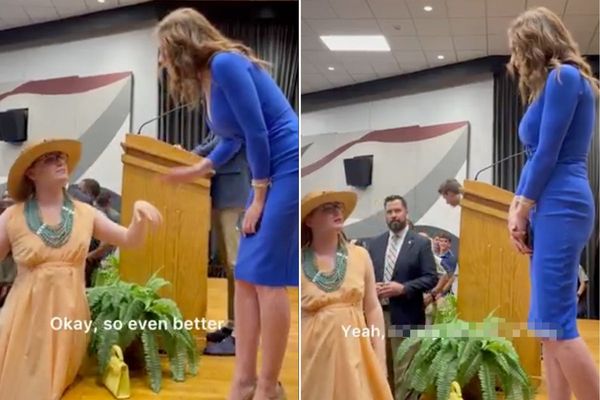
After Donald Trump issued an executive order to limit birthright citizenship last month, Marilyn Hemingway, the CEO and president of the Gullah Geechee Chamber of Commerce, knew she had to do something. Based in Georgetown, South Carolina, the GGCC helps preserve the history of Gullah Geechee people, the Africans who were enslaved on the Sea Islands along the Atlantic coast, and their descendants. One such person was Joseph Hayne Rainey, a man born in Georgetown and enslaved until his father purchased his freedom when he was 10. Rainey is who Hemingway immediately thought of following Trump’s order.
Rainey was the first Black person elected to the United States congress, where he was known for his support of the 14th amendment, which was ratified in 1868 and stated: “All persons born or naturalized in the United States, and subject to the jurisdiction thereof, are citizens of the United States and of the State wherein they reside.” The amendment was necessary to give the roughly 4.5 million Black people in the country citizenship after emancipation, as a previous supreme court case, Dred Scott v Sandford, had denied citizenship to all people of African descent.
Rainey’s support for the laws passed during Reconstruction was deeply informed by his life in enslavement. He spent much of his time in Congress fighting to protect Black Americans and to ensure the 14th and 15th amendments – the latter of which prohibited the federal government from denying a citizen the right to vote based on race, color or previous condition of servitude – were enforced.
“The 14th amendment was passed and ratified because once those who were enslaved were emancipated, it was like they didn’t have standing,” Hemingway said. “Where were they in this world now? They were no longer enslaved, so they needed to be made citizens … [Rainey] went from an enslaved person to an emancipated person to a citizen. His personal story reflects the American story.”
Now, the amendment that has long granted birthright citizenship is being used by the US president to deny citizenship to the children of recent immigrants. “The Fourteenth Amendment has never been interpreted to extend citizenship universally to everyone born within the United States,” his EO reads. It “has always excluded from birthright citizenship persons who were born in the United States but not ‘subject to the jurisdiction thereof’”.
Trump’s executive order almost immediately faced several lawsuits from civil rights groups and Democratic attorneys generals, as well as a temporary restraining order from a federal judge. A federal appeals court has denied the administration’s request to reinstate a ban, but the threat still looms, especially as the president has said he expects the supreme court to side with him on the decision.
“The first line of the 14th amendment is designed to say that anyone who was born or naturalized in the United States and subject to the jurisdiction of the United States is a citizen,” said Jamal Greene, a professor at Columbia Law School. “That doesn’t depend on their race or their ethnicity or anything else about them. The only question is whether they’re subject to the jurisdiction of the United States.”
Trump’s administration has harped on the phrase “subject to the jurisdiction of the United States”, which was understood to refer to people who were not subject to US law, Greene said. That would have meant diplomats from other countries, Indigenous people, who are sovereign, and, potentially, an invading army. But now Trump is trying to use that language to apply to a wide group of people, including children whose parents were not lawfully in the US at the time of their birth.
Greene said that those who support such an understanding of the law are suggesting that those people would not have an allegiance to the US. “But that interpretation is not consistent with how it would have been originally understood,” he said. “And it’s also not consistent with the language itself, since jurisdiction is not a reference to allegiance. It’s a reference to whether US laws apply to those people.”
Some are also concerned about the order’s potential reach to citizens, such as Black Americans. The GGCC, for its part, argues that Trump’s order is an attempt to undo some of Rainey’s work. For Rainey, the 14th amendment was not just for Black Americans – it was for everyone. “To all people born unnaturalized into the United States, [the 14th amendment] is the first time in the history of the United States that it actually covered citizenship, including of formerly enslaved people,” Hemingway said. “They were the impetus for this, but it covered everyone. So we have to be very careful when we come and we start attacking it, because it’s not just going to remove citizenship of immigrants, it’s going to remove citizenship of everyone.”
Though the restraining order blocks Trump’s plan, the future of birthright citizenship will be undecided until the supreme court hears the case. In the meantime, Hemingway is continuing to promote Rainey’s life and continue his fight.
“This is why we speak out to make sure correct history is told … We still have to have the same fight for civil rights. [Rainey’s] actions inform our actions to this day. His story needs to be told more so that we could hold all of our elected officials accountable to the United States constitution. We are in a constitutional crisis. His life explains why we continue the fight.”







